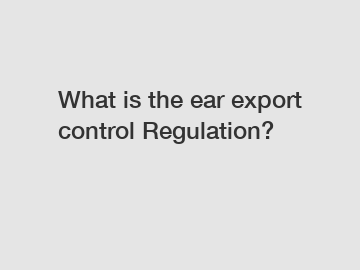What is the ear export control Regulation?
The world of international trade regulations can be a complex and challenging landscape to navigate. One area that often confuses and concerns businesses is export control regulations. In particular, the ear export control regulation, which is a crucial component of the United States export control system.
The Export Administration Regulations (EAR) are a set of regulations that govern the export of goods and technology from the United States. The EAR is administered by the Bureau of Industry and Security (BIS), which is part of the U.S. Department of Commerce. The goal of the EAR is to protect U.S. national security, foreign policy interests, and economic interests by regulating the export of sensitive goods and technology.
The EAR covers a wide range of products, software, and technology that have the potential to be used in both civil and military applications. This includes items such as defense articles, technology related to nuclear, biological, and chemical weapons, and certain encryption technology. The regulation also covers the export of items that are subject to international trade restrictions, such as items on the Commerce Control List (CCL) or the U.S. Munitions List (USML).

One of the key components of the EAR is the Export Control Classification Number (ECCN) system. The ECCN system is used to categorize items on the CCL and determine if they require an export license for export. Items are classified into one of ten categories, with each category containing further subcategories and classifications. The ECCN system helps businesses determine whether their products are controlled for export and if they need to apply for a license.
It is important for businesses to understand the EAR and comply with its regulations when exporting goods and technology. Failure to comply with the EAR can result in penalties, fines, and even criminal charges. Therefore, it is crucial for businesses to be aware of their obligations under the EAR and take steps to ensure compliance.
One way to ensure compliance with the EAR is to conduct regular export control assessments of your products and technology. This involves identifying the classification of your items under the ECCN system and determining if they require an export license for export. It is also important to screen your customers and end-users to ensure they are not prohibited parties under U.S. export control laws.
Another important aspect of compliance with the EAR is to implement robust export compliance programs within your organization. This includes establishing policies and procedures for screening customers and end-users, obtaining export licenses when required, and training employees on export control regulations. By investing in export compliance programs, businesses can minimize the risk of non-compliance and protect their reputation and bottom line.
In conclusion, the EAR export control regulations are a vital component of the U.S. export control system. Businesses that export goods and technology must understand and comply with the regulations to protect U.S. national security, foreign policy interests, and economic interests. By conducting regular export control assessments, implementing export compliance programs, and staying up-to-date on changes to the regulations, businesses can navigate the complex world of export control regulations with confidence.
If you want to learn more, please visit our website Order Headphones for Delivery, Radio Hearing Protector Price, Ear Protection Wholesalers.


